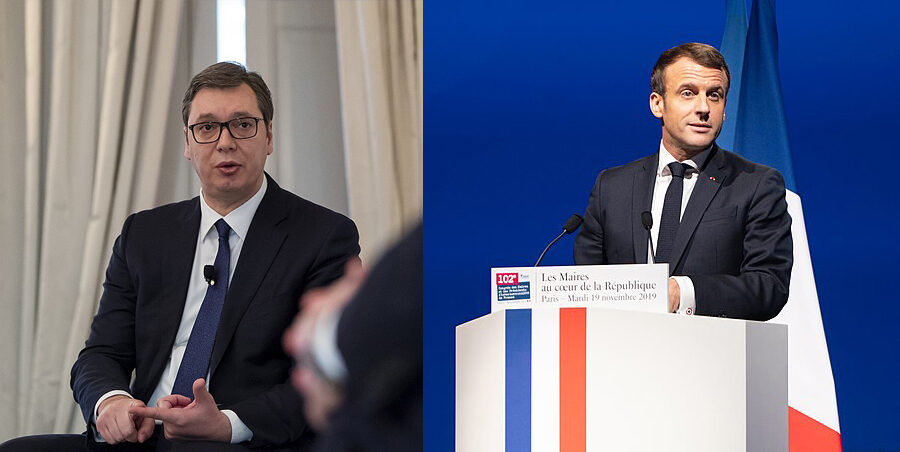While France continues to lose influence in its former African colonies, Paris is reportedly aiming to strengthen its economic presence in Serbia. For the European Union’s second largest economy, the Balkan nation might play a crucial role in its ambitious nuclear plans.
During the late 19th century, and until the end of World War 2, Serbia (later Yugoslavia) and France had allied relations. Prior to World War 1, close military, economic, and political cooperation between Belgrade and Paris had even threatened the traditional Serbian inclination towards Russia. But everything changed following the breakup of Yugoslavia in the 1990s, when Serbian and French interests began to diverge.
During the Yugoslav wars, France openly supported the Croats, Bosnian Muslims, as well as Kosovo Albanians, against the Serbs. Paris also actively participated in the NATO bombing of Yugoslavia in 1999, although the then French President Jacques Chirac reportedly vetoed the destruction of Belgrade bridges.
But in 2008, Paris recognized Kosovo’s unilaterally declared independence from Serbia, which had an additional impact on Serbian-French relations. Moreover, on November 11, 2018, during the ceremony to mark the centennial of the First World War, the protocol of the French President placed the President of Serbia Aleksandar Vucic outside the official stand, and outside the range of television cameras. The move represented a huge humiliation not only for Vucic, but also for Serbia. Even some French media said that Serbia, a country that lost around 30 percent of its overall population in the Great War, was “unjustly humiliated.”
As a result, an anti-French mood became apparent in the Balkan country, although that did not have a negative impact on bilateral ties between Belgrade and Paris. Ever since, France has been increasing its economic presence in Serbia.
In 2019, the French company Vinci took over the 25-year concession of Belgrade Nikola Tesla Airport. Two years later, the Serbian government signed a $5.35 billion Memorandum of Understanding with French companies Alstom and Egis, as well as with China’s Power Construction Corporation, on the construction of a metro in Belgrade.
On April 5, 2024, the Government of Serbia approved a Memorandum of Understanding with the French energy company Electricite de France (EDF), for the establishment of a cooperative relationship for energy transition. The document, according to the Serbian Ministry of Energy, creates the conditions for a strategic partnership in assessing the potential for the development of a civilian nuclear program in Serbia.
Belgrade is expected to amend the regulations to enable the construction of nuclear power plants in the country. That, however, does not necessarily mean that the Balkan nation will produce nuclear energy anytime soon, if at all. According to Serbian Minister of Mining and Energy Dubravka Djedovic Handanovic, the Memorandum Belgrade signed with EDF “envisages the possibility of cooperation in the development of solutions for energy storage, including batteries and green hydrogen.”
Given that in 2011 the Nuclear Facilities of Serbia public company announced that the largest nuclear waste disposal site in Europe will be located in Serbia, critics fear that France might turn the southeastern European nation into a nuclear dump.
It is no secret that, over the years, Paris has been using Russia as a “garbage dump for the French nuclear industry”. Despite the war in Ukraine, and tense relations between France and Russia, EDF continued doing business with Russia’s nuclear giant Rosatom. The Russian company buys French reprocessed uranium that it converts into nuclear fuel in western Siberia. France then purchases “nuclear industry products” from its Russian partners.
But since French President Emmanuel Macron has been actively pushing his concept of European “strategic autonomy”, it is entirely possible that France will eventually have to end its nuclear cooperation with Russia. Although Serbia does not have capacity to take Rosatom’s role and begin “recycling” French uranium, Macron almost certainly sees the southeastern European nation as an important actor in his nuclear policy.
“I am convinced that Serbia can play an important role in strengthening the strategic autonomy of the European Union. You are already doing it, and tomorrow you will do it with your industrial development,” Macron said on April 8, following his meeting with Vucic in Paris.
Serbia, on the other hand, hopes to buy Rafale fighter jets from France, as that would allow the Balkan nation to replace its Russian-sourced MiG-29s. But since France openly supports Kosovo, and expects Belgrade to recognize secession of its own territory, it remains highly uncertain whether Paris will agree to supply Serbia with jets that it can potentially use against what it sees as its breakaway province.
That is why, for Paris, Serbia’s recognition of Kosovo remains one of the top priorities as such a move, from the French perspective, would mean “full normalization” of relations between Belgrade and Pristina.
Meanwhile, France will undoubtedly continue pursuing its ambitious economic and nuclear interests in Serbia.
Images: Guelland/ MSC and Jacques Paquier

